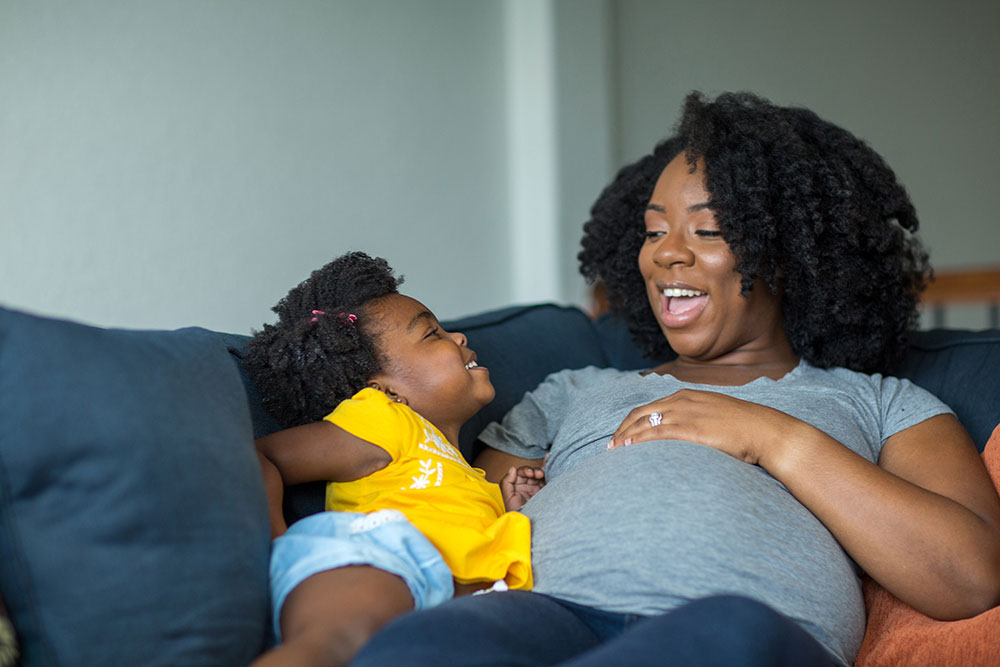Baby’s Reactions to Noise Inside the Womb

Your relationship with the budding life within you begins long before her birth. Pregnant women can feel strong emotional ties to their growing babies, and the babies are forming their own primitive attachments.
The womb is a warm haven where an unborn baby enjoys solitude, but not complete isolation. Her senses are gradually developing, and she will experience sensations relating to taste, smell, sight, sound and touch before her grand entrance. Hearing becomes an important intellectual link, delivering clues from the other side. Your baby will react to loud noises by nine weeks of pregnancy; by the end of the second trimester, baby’s hearing is fairly developed.
Even when you are enveloped in silence, your baby enjoys the soothing rush of steady noise delivered by your heartbeat, respiration and digestion. All incoming sounds are filtered through amniotic “white noise” before they register with your baby’s ears. White noise machines or household noisemakers such as a quiet vacuum or blow drier are comforting to your baby after birth because they are reminiscent of the oceanic sounds of prenatal life.
Voice Therapy
Studies with newborn babies show that a newborn is responsive to her mother’s voice hours after birth, suggesting that she recognizes and remembers the sounds from the womb. Your voice becomes familiar to your developing baby and carries a distinct tonal quality. The mother’s voice is conducted through bone and tissue to create a unique reverberation that differs from other voices penetrating the amniotic wall.
A newborn is most receptive to her mother’s voice when it’s filtered through noise comparable to amniotic fluid. She is also most comforted by her native language—a newborn will subconsciously feel the shift in cadence when mom speaks a language other than her usual tongue! A baby is measurably calmed by her mother’s voice inside the womb and after birth. Comforting your baby while she’s in utero is a simple task. What you say is not important; she simply wants to feel the rhythm and tone of your voice. Speak in a calm voice and try to avoid yelling, as it will startle your baby and may disrupt her sleep cycle.
Your partner and other close family and friends should follow the same guidelines. As your baby’s hearing develops, she is able to recognize familiar voices after birth and can distinguish between voices even while inside your baby bump. It’s appropriate to speak, read or sing to your belly, but loud sounds, poking and flashlight probing can be disruptive to crucial developmental patterns. Your partner will build his own emotional bond with your newbie as he speaks to her and dreams of things to come.
The Sound of Music
Although playing classical music during pregnancy will not necessarily raise your baby’s SAT score, it can be a calming influence for you and your growing babe. Music can also stimulate prenatal learning in the form of pre-linguistic cognitive development. Choose melodies that are consonant and simple (think “cheerful”): look for “baby-friendly” classical music playlists with simplified renditions of familiar tunes. Each song may be reduced to a single melody on a single instrument, perhaps with “white noise” in the background to comfort your little one after birth.
Singing to your in-utero baby may further her subconscious familiarity with language development and bring her comfort as she sways to the rhythm of your voice. Your newborn baby starts to recognize oft-repeated melodies and lullabies from her days in the womb once she has arrived. Babies have also been shown to react to familiar music by calming or becoming more focused and alert, so there’s plenty of reason to start implementing music into your daily prenatal routine.
It’s important to note that prolonged exposure to increased noise levels can cause changes in stress in a pregnant woman’s body, according to the Centers for Disease Control and Prevention (CDC). These changes can affect hearing development. Though sound is muffled inside the womb, very loud noises, especially in abundance, may still be able to damage fetal hearing or cause hearing loss. However, chances are if it’s relaxing to you, it’s probably safe for your baby, but check with your healthcare provider if you have concerns.







